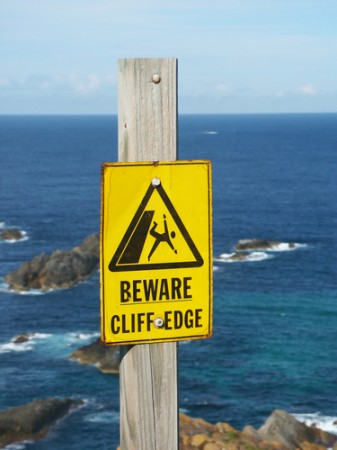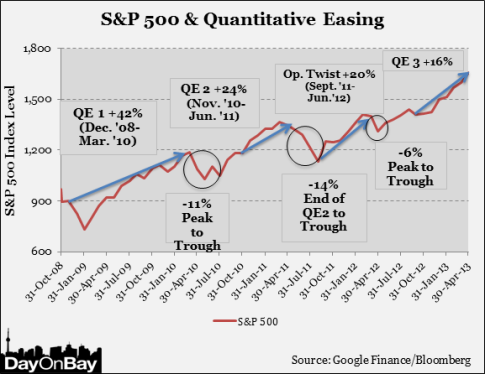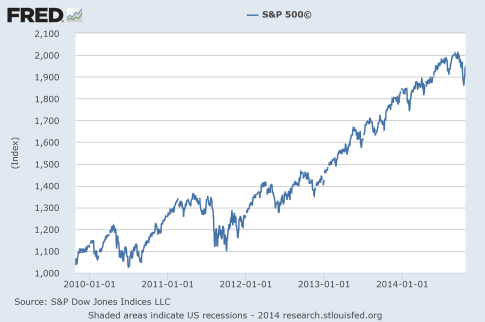Demanding QE4.
– How Will The Stock Market React To The End Of Quantitative Easing? (Economic Collapse, Oct 26, 2014):
It is widely expected that the Federal Reserve is going to announce the end of quantitative easing this week. Will this represent a major turning point for the stock market? As you will see below, since 2008 stocks have risen dramatically throughout every stage of quantitative easing. But when the various phases of quantitative easing have ended, stocks have always responded by declining substantially. The only thing that caused stocks to eventually start rising again was a new round of quantitative easing. So what will happen this time? That is a very good question. What we do know is that the the performance of the stock market has become completely divorced from economic reality, and in recent weeks there have been signs of market turmoil that we have not seen in years. Could the end of quantitative easing be the thing that finally pushes the financial markets over the edge?
After all this time, many Americans still don’t understand what quantitative easing actually is. Since the end of 2008, the Federal Reserve has injected approximately 3.5 trillion dollars into the financial system. Of course the Federal Reserve didn’t actually have 3.5 trillion dollars. The Fed created all of this money out of thin air and used it to buy government bonds and mortgage-backed securities.
If that sounds like “cheating” to you, that is because it is cheating. If you or I tried to print money, we would be put in prison. When the Federal Reserve does it, it is called “economic stimulus”.
But the overall economy has not been helped much at all. If you doubt this, just look at these charts.
Instead, what all of this “easy money” has done is fuel the greatest stock market bubble in history.
As you can see from the chart below, every round of quantitative easing has driven the S&P 500 much higher. And when each round of quantitative easing has finally ended, stocks have declined substantially…
And of course the chart above tells only part of the story. Since April 2013, the S&P 500 has gone much higher…
If someone from another planet looked at that chart, they would be tempted to think that the U.S. economy must be expanding like crazy.
But of course that is not happening.
This market binge has been solely fueled by reckless money printing by the Federal Reserve. It is not backed up by economic fundamentals in any way, shape or form.
And now that quantitative easing is ending, many are wondering if the party is over.
For example, just check out what CNN is saying about the matter…
Even in this bull market, all good things must come to an end.
The Federal Reserve is expected to close a chapter in history this week and announce the conclusion of its massive stimulus program. Known as quantitative easing, the program is widely credited with driving investors back into stocks in the aftermath of the financial crisis.
“I think to some extent quantitative easing has provided an assurance to investors that (has) kept them optimistic,” said Bruce McCain, Chief Investment Strategist of Key Private Bank in Cleveland, Ohio. “Now we’re going to have to see whether investors can ride without training wheels.”
Everyone knows that quantitative easing was a massive gift to those that own stocks.
So how will the stock market respond now that the monetary heroin is ending?
We shall see.
Meanwhile, deflationary pressures are already starting to take hold around the rest of the globe. The following is an excerpt from a recent Reuters report…
After months of focus on slack in U.S. labor markets, the Federal Reserve faces a new challenge: the possibility that weak inflation may be so firmly entrenched it upends the return to normal monetary policy.
The soft global inflation backdrop, from sliding oil prices to stagnant wages in advanced economies, has triggered debate over whether the Fed and its peers merely need to wait for a slow-motion business cycle to improve, or face a shift in the underlying nature of inflation after the global recession.
That uncertainty has become the Fed’s chief concern in recent weeks, likely to shape upcoming policy statements and delay even further the moment when interest rates, pinned near zero for nearly six years, will start rising again.
If the Federal Reserve and other global central banks were not printing money like mad, the global economy would have almost certainly entered a deflationary depression by now.
But all the Federal Reserve and other global central banks have done is put off the inevitable and make our long-term problems even worse.
Instead of fixing the fundamental problems that caused the great financial crash of 2008, the central bankers decided to try to paper over our problems instead. They flooded the global financial system with easy money, but today our financial system is shakier than ever.
In fact, we just learned that 10 percent of the biggest banks in Europe have failed their stress tests and must raise more capital…
The European Central Bank says 13 of Europe’s 130 biggest banks have flunked an in-depth review of their finances and must increase their capital buffers against losses by 10 billion euros ($12.5 billion).
The ECB said 25 banks in all were found to need stronger buffers — but that 12 have already made up their shortfall during the months in which the ECB was carrying out its review. The remaining 13 now have two weeks to tell the ECB how they plan to increase their capital buffers.
Most people do not realize how vulnerable our financial system truly is. It is essentially a pyramid of debt and credit that could fall apart at any time.
Right now, the “too big to fail” banks account for 42 percent of all loans and 67 percent of all banking assets in the United States.
Without those banks, we essentially do not have an economy.
But instead of being careful, those banks have taken recklessness to unprecedented heights.
At this moment, five of the “too big to fail” banks each have more than 40 trillion dollars of exposure to derivatives.
Most Americans don’t even understand what derivatives are, but when the next great financial crisis strikes we are going to be hearing a whole lot about them.
The big banks have transformed Wall Street into the biggest casino in the history of the planet, and there is no way that this is going to end well.
A great collapse is coming.
It is just a matter of time.



Even worse is that after this BS twisted financial game played with the nation’s wealth over the past seven years, the US dollar emerges as a weak player in the world economy. In 2007, we were the world financial leader, except for those of us who carefully read the wonderful coverage in the Wall Street Journal and the New York Times about what the bankers were doing with our money and our future. The Wall Street Journal spelled it all out to those of us willing to read about Enron, moving debt to shell corporations, printing money over and beyond its value base……..before Murdoch bought it……it was the best financial news outlet in the nation.
People called me after the crash and said I was the only one talking about Fannie and Freddie, and all the rest of it……and I told them, it was the Wall Street Journal, not me. All I did was read the outstanding coverage of the corruption going on everywhere. That paper was the #1 source for all for the past 25 years…..now, it is a Murdoch controlled rag. A great loss for those of us seeking financial truth in journalism.
Now, we get nothing but lies. The White House took total control of the media in 2000…….and now, we have no journalism, just spin, obfuscation and propaganda. We are told good is bad, bad is good, and the market going up means the economy is getting better regardless it goes up every time a few more thousand people lose their jobs for good, and more temps take the place of fully employed workers……the market is great for greedy guts, nobody else.
The corruption was so bad that it became obvious to the world the US had sunk to third world levels and could no longer be trusted. The world started looking for ways to get free of the dollar, and the crooks controlling it. The basket of currencies, the one that allowed nations to trade with each other directly, was the solution. Today, 67% of world nations no longer use the dollar, down from 100% in 2010.
The basket of currencies is brutal, there is no way to shield each nation from the true value of their currency, such as the world reserve currency offered, but the devil is always in the details. Japan is an excellent example. For the past 20+ years, it had been a lender to the US, buying US securities at very low rates of interest, and it had been in a deflation since the 1990s. Two years after membership in BRICS, it is now suffering hyper inflation. There is no outside currency to hide behind, and the new economic system is brutal by comparison.
I fear we are on the precipice of a far worse depression than we have ever seen…..
I have been thinking about this for a while. In my opinion, the greedy guts have been preparing for this end for a while. My guess is that they will pump the market a bit to show fool Americans that the market has recovered, all is good, QE is no longer necessary, the recession is over.
Tell that to the nearly 400,000 workers who lose their jobs every week. They only count them once, so if the number drops to 390K next week, they can say jobless claims are DOWN, the recession is over, happy days are here again……….
This is my take, but I am an admitted cynic.